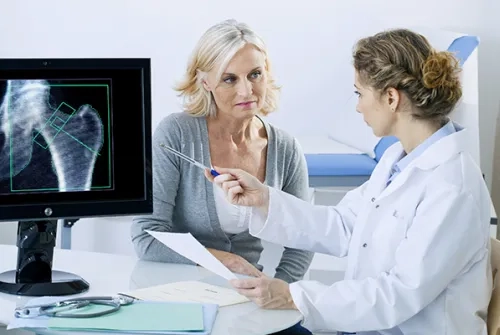Alo Yeditepe
Alo Yeditepe
Beware, These Risks Increase After Menopause!
Stating that the cessation of menstruation is not the only result of menopause, Gynecology, Obstetrics, and IVF specialist Assoc. Dr. Melis Gökçe Koçer Yazıcı warned that women may face new health problems due to the decrease in hormone levels with menopause and gave information about 5 risks that may be encountered after menopause.
With the onset of menstrual bleeding, approximately 400,000 eggs are produced in the ovaries of a healthy woman, and a few of these eggs reach maturity each month. This number decreases over the years. During menopause, ovulation stops, and the production of estrogen and progesterone hormones ceases. The woman can no longer be pregnant. "Without the protective effects of hormones such as estrogen, women are at high risk for heart disease, weight gain and other health problems," stated Yeditepe University Hospitals Gynecology and Obstetrics Specialist Assoc. Dr. Melis Koçer Yazıcı followed that the hormone levels that keep the menstrual cycle regular have additional tasks in the body and that women will face health problems such as heart disease, stroke and osteoporosis when these hormone levels decrease with menopause. Assoc. Dr. Yazıcı listed 5 health problems that can be encountered after hormonal changes, even if there is no health problems before menopause, and said that these hormone levels decrease with menopause. Assoc. Dr. Yazıcı listed 5 health problems that can be encountered after hormonal changes, even if there is no health problem before menopause.
“Higher Risk of Heart Disease in People Who Fever in Early Period”
Underlining that the most important danger that women may face after menopause is heart diseases, Yeditepe University Hospitals Gynecology, Obstetrics, and IVF specialist Assoc. Dr. Yazıcı also stated the following: "According to the data of the American Heart Association (AHA), the cardiovascular disease develops in about one-third of women and the rate of heart attack begins to increase especially about ten years after menopause. In the blood vessels, estrogen helps to provide flexibility and thus helps the blood flow to adapt to the pressure and helps the vessels to contract and expand. This benefit is lost when estrogen decreases. Combined with other changes that can thicken artery walls, such as an increase in blood pressure, women's hearts suddenly become vulnerable.
In addition to the studies of the AHA, the American National Women's Health Study (SWAN) also has a research examining the physical, biological, psychological, and social changes that women experience in middle age. With this research, it was determined that women who experience hot flushes earlier during menopause have a higher risk of heart disease."
Stating, "In an article published in the Journal of the American Heart Association in February 2021, the results of the SWAN study were supported by the data that frequent and persistent hot flashes are associated with future cardiovascular diseases," Assoc. Dr. Melis Koçer Yazıcı also warned that women with a family history of heart disease or who experience significant hot flashes should consult a physician about whether they need additional screening for cardiovascular diseases.
Smoking Increases the Risk of Osteoporosis
It is known that women are 4 times more likely to develop osteoporosis, a disease in which bones become thinner and weaker and break more easily, than men. While women's bones are protected by estrogen before menopause, bone loss is rapid in the year before the last menstrual period and in the three years following it. Stating that exercises such as brisk walking or jogging are important to keep the bones strong. Assoc. Dr. Yazıcı also emphasized that smoking is also linked to the risk of bone fractures and osteoporosis as a result of this research.
Pointing out that consuming foods rich in vitamin D (vitamin D-fortified orange juice, cereals, and milk) will also help reduce the risk of osteoporosis, Assoc. Dr. Yazıcı stated that "sun exposure for 15 minutes a few days a week and a healthy diet containing calcium (dark leafy greens, dairy products, fish such as salmon and sardines) will be beneficial"
Slowing Metabolism Causes Weight Increase
Stating that menopause has a definite effect on women's metabolism and that adipose tissue increases compared to lean body mass with the slowdown in female metabolism during menopause, Assoc. Dr. Melis Gökçe Koçer Yazıcı added the following: "This period, which starts about two years before the last menstrual period, continues until two years after menopause, causing loss of lean tissue mass. Studies have shown that excess weight and fat, especially around the abdomen, is dangerous because it can increase the risk of type 2 diabetes and heart disease. Even menopause itself is linked to an increased risk of metabolic syndrome. High blood pressure, high blood sugar, excess abdominal fat, and abnormal cholesterol levels are associated with increased risk of heart disease, stroke, and type 2 diabetes."
Urinary Tract Infections Increase After Menopause
Stating that the decrease in estrogen levels after menopause can cause thinning of the vaginal tissue and dryness in the tissues, which can facilitate the development of bacteria and lead to the development of urinary tract infections (UTI) more easily and frequently, Assoc. Dr. Yazıcı stated that. "Scientific studies show that the rate of UTI in women over 65 years of age increases by an average of two times compared to women of all ages". She also made some suggestions to reduce the risk of UTI:
"The longer your urine stays in your bladder, the more bacteria can grow. Therefore, when you have the urge to urinate, go to the toilet without holding it any longer. Even if you do not need urine, do not hold urine for more than 3-4 hours and go to the toilet. Clean after the toilet by wiping from front to back. Drink plenty of fluids, preferably at least 6-8 glasses of water a day. Urinate before and after sexual intercourse. Avoid vaginal showers and the use of deodorant sprays for feminine hygiene purposes. Choose air-permeable cotton underwear and avoid tight trousers. If you have frequent UTIs (3-4 times a year), it may be necessary to investigate what may cause them and receive treatment, contact your physician."
Urinary incontinence problems may also become more frequent
Stating that urinary incontinence disorders increase even more after menopause, Yeditepe University Hospitals Gynecology, Obstetrics, and IVF specialist Assoc. Dr. Melis Koçer Yazıcı added that the type of urinary incontinence called "stress urinary incontinence" in the form of leakage with coughing, sneezing, or physical activity is common among women. Stating that the type of urinary incontinence in the form of leakage accompanied by an uncontrollable urge to go to the toilet, called "urgency incontinence", can also be encountered frequently, Assoc. Dr. Yazıcı also made the following suggestions to prevent urinary incontinence: "Empty your bladder as often as possible. "Kegel exercises" are recommended to strengthen the pelvic floor muscles. The most important point of this exercise is to strengthen the fine muscles that control the urine flow, not the iliac muscles. You can do this by holding your pee while urinating, causing the muscles there to contract. Each urinary retention, i.e. contraction, should last an average of 3-4 seconds and you should repeat this exercise 5-10 times every day. If your complaints persist despite these, consult your physician"
Press Coverage: cumhuriyet | posta | gazetevatan | cnnturk | sabah | takvim | yenicaggazetesi | medyatava
About
Faculty and Year of Graduation:
İstanbul University Faculty of Medicine, 2007
”
See Also
- Contraceptive Methods: Birth Control and Effective Protection Options
- What is Pelvic Floor? What are Their Duties?
- What is Hysteroscopy? Hysteroscopy Usage Areas
- Menopause Symptoms and Menopause Treatment
- How Does Working Life Affect Prospective Mothers?
- Causes of Female Infertility
- Chronic Pelvic Pain
- What is Polycystic Ovary Syndrome/PCOS?
- Postpartum Period
- 7 Effective Tips Against Urinary Incontinence
- Imaging Methods During Pregnancy
- Causes of Male Factor Infertility
- The Effect of Advanced Age on IVF Treatment
- Infertility
- Polycystic Ovary Syndrome
- Early Menopause
- Blocked Fallopian Tube
- Vaginismus
- Low Ovarian Reserve (AMH)
- Which Methods Increase Success in Treatment of Infertility?
- Intrauterine insemination (IUI)
- Microinjection
- Egg Cryopreservation
- Assisted Hatching
- Micro-chip
- Pre-implantation Genetic Diagnosis
- Thyroid Diseases During Pregnancy Affect the Baby as Much as the Mother
- Endometriosis
- Co-Culture
- Ovarian Rejuvenation / PRP
- As Average Life Expectancy Increases, This Problem Will Be Seen More
- What Is the Period of Fertility? What Tests are Performed for Fertility?
- Considerations for Embryo Transfer
- What Causes Menstrual Irregularity, How Is It Treated?
Alo Yeditepe




